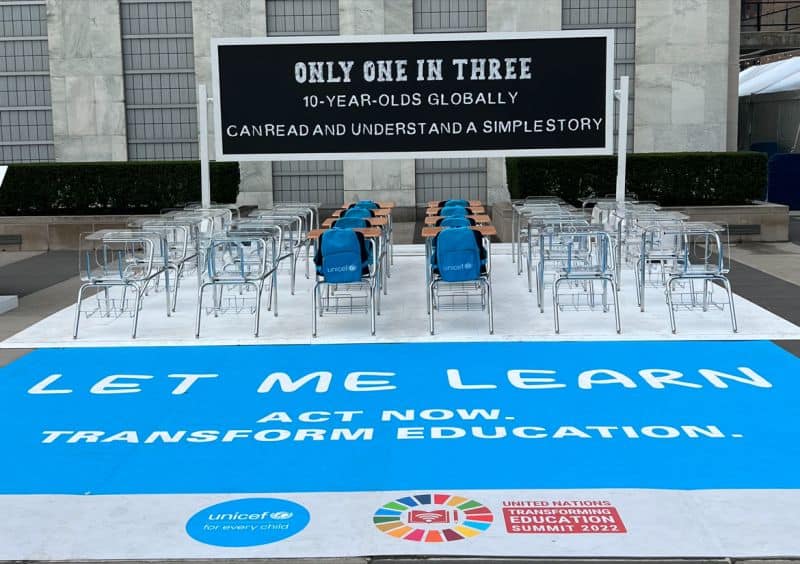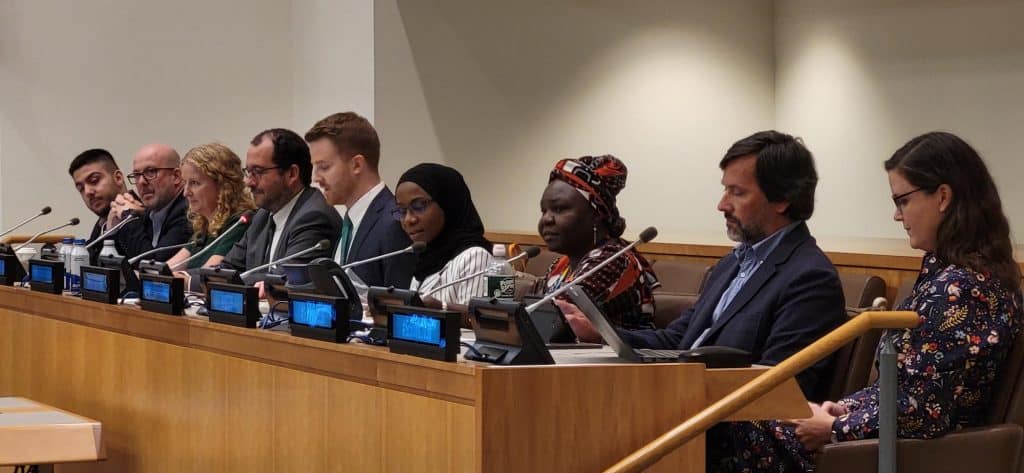The Transforming Education Summit (TES) was convened at the United Nations General Assembly in New York this September against a backdrop of multiple, intersecting crises: active conflicts in over twenty countries leading to high levels of displacement and migration, rising costs and falling living standards across the globe, and the no-longer just “looming” environmental catastrophe evidenced with flooding in Pakistan, drought in East Africa and wildfires in California. How does the global crisis in education – a crisis of equity, inclusion, quality and relevance – relate to and exacerbate these other crises?

Or framed another way: what should be the educational response to these global crises? TES brought global stakeholders together to build a movement for educational change, one that advances relevant knowledge and skills: literacy and numeracy, digital competencies, sustainable technologies, green energy solutions. But a movement for quality, inclusive education must also centre on attitudes and values: global citizenship, respect for diversity, compassion and empathy, environmental awareness.
Dr. Matt Reed, AKF’s CEO in the U.K., refers to the three Ms necessary for making a movement: Message, Models, and Momentum. TES was an example of the 3M model in action: over the course of three days, representatives from governments around the world were joined by youth, teachers, civil society leaders, international organisations and donor agencies to develop clear messaging around the need to transform education systems, to share models of impactful education solutions, and to build global momentum to ensure we make real progress on the goals of SDG4 over the next eight years. This short piece reflects on some of the messages and models that emerged at TES and the momentum that will carry forward as we inch ever closer to 2030.
Messages
The clear and overriding message at TES was a sense of urgency: that the pace of global change is increasing and that education systems are not reacting quickly enough; that we urgently need to transform the way we live and work but that we can only do so if we transform the way we learn. Secretary-General Antonio Guterres’s vision statement spoke of transforming education as the “urgent political imperative for our collective future”. The Youth Declaration, which was developed on Day 1 of TES, articulated this urgent imperative into a set of recommendations and demands for member states. These were discussed and debated across the three-day event with broad consensus emerging in several areas:
- Participants spoke with one voice on the need for more relevant and adaptable curricula that includes digital, technical and green skills; addresses psycho-social and sexual health; and nurtures young people’s inherent creative, collaborative and problem-solving mindsets.
- There was a clarity from all participants on the need for education systems to be decolonised and democratised so that all learners and teachers can participate actively in decision-making about pedagogy, curricular content and other policy areas.
- Many attendees highlighted personal stories of educational exclusion and inequity, leading to loud calls for schools and educational settings to be more inclusive and pluralistic and for education to be a driver (rather than a barrier) of social equity.
- There was widespread recognition that we need a revolution in teacher recruitment, training and professional development in order to achieve quality, equitable learning for all. Transforming education systems will not be possible if we do not first transform the way we support and elevate the teaching profession.
Models
Day 2 of TES, Solutions Day, featured “live” models of transformative educational practices from around the globe. Schools2030 was among a handful of initiatives selected as a solution to advance Teachers, Teaching and the Teaching Profession, and the Schools2030 team – including Ministers of Education from Portugal and Zanzibar, a teacher from Lisbon, and representatives from the Aga Khan Foundation, the LEGO Foundation, Global Partnership for Education and UNICEF Generation Unlimited – were able to show the TES crowd how Schools2030’s Three-Step model for teacher-driven educational change can be replicated to improve learning outcomes and strengthen education systems globally.
Throughout TES Solutions Day, we heard about new models and approaches to transform education in partnership with government, civil society and international organisations. This included solutions to support the transition to a green economy and promote sustainable development; solutions to close gaps in digital connectivity and skills; and solutions to support inclusion for students who have diverse learning needs, including learners who are outside of formal schooling and those caught in crisis.
But when you look “behind the curtain” of all these solutions, at the centre is always the teacher and the learners, rooted in their community context. No matter what the educational question is, the answer will always be: support the teachers and the learners to react to their contextual realities and to build from where they are standing. That is why Schools2030 offers an adaptable, replicable model that can underpin any effort at educational transformation. Our three-step model is built on contextual-relevance and flexibility, and relies on the agency of teachers and learners to define their learning needs and work together on solutions.

Momentum
As TES fades to memory, it is imperative that the sense of urgency we all felt at the summit is not allowed to wane. Post-summit, the SDG4 High Level Steering Committee have identified Seven Calls to Action – thematic areas for which educational solutions are needed, including greening education, advancing gender equity, learning in conflict-affected contexts and transformative education financing. These focal areas underscore not only the global education crisis but also the role education can and must play in addressing our other global crises. But as we seek solutions to these crises, we cannot lose sight of the teacher and the learners, living in and reacting to their social, political, economic and environmental contexts. It is at the classroom and community level where the educational crisis is most acutely felt and it is there that the momentum for change must be driven.
In June 2023, Schools2030 will host our second Global Forum in Porto, Portugal. We will be joined by teachers, youth and education stakeholders from around the world to assess our progress on the messages and models raised at TES. This will be an opportunity for our global community to learn how teachers and school communities across ten countries are keep up the momentum to 2030 and how they are driving contextually-relevant education solutions to achieve SDG4 – quality, equitable learning for all.
